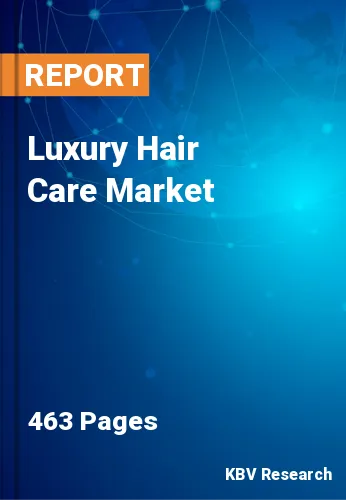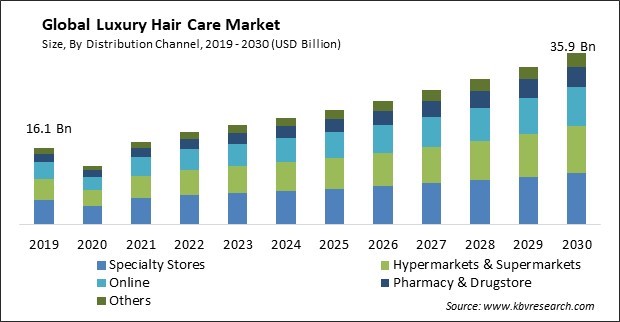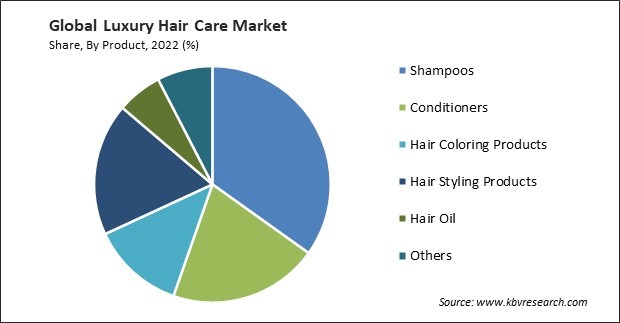
The Global Luxury Hair Care Market size is expected to reach $35.9 billion by 2030, rising at a market growth of 8.1% CAGR during the forecast period. In the year 2022, the market attained a volume of 2,49,651.1 thousand units, experiencing a growth of 7.8% (2019-2022).
Luxury hair styling products offer a wide range of creative styling options. Therefore, the Hair Styling Products segment acquired $3,523.2 million in 2022. From sleek and polished looks to textured and voluminous styles, these products allow consumers to express their individuality and experiment with diverse hairstyles. Luxury hair styling products are designed to provide long-lasting hold, keeping hairstyles in place throughout the day or evening. This particularly appeals to consumers attending events, parties, or professional engagements. Some luxury styling products focus on providing a glossy finish to the hair. These formulations impart shine and luminosity, creating a polished and sophisticated look. Some of the factors impacting the market are influence of social media and celebrity endorsements, growing demand for natural and sustainable products, and adverse effect of supply chain disruptions.

Social media platforms, particularly Instagram and YouTube, shape beauty trends. Influencers and celebrities showcasing their hair care routines and endorsing luxury products contribute to the aspirational appeal of these items, driving consumer adoption. Celebrities often have a significant influence on their followers. When a celebrity endorses a luxury hair care product, it can enhance the brand's credibility in the eyes of consumers. Authentic endorsements from celebrities who genuinely use and believe in the products they promote build trust with consumers. This trust creates a positive perception of the brand's effectiveness and quality. Additionally, consumers are increasingly aware of the environmental impact of beauty products. The brands incorporating natural, organic, and sustainable ingredients in their formulations are gaining favor among environmentally conscious consumers. Brands that adopt eco-friendly packaging practices, reducing their carbon footprint, resonate with consumers who prioritize sustainability. Consumers increasingly avoid hair care products containing harsh chemicals, parabens, sulfates, and synthetic fragrances. The brands responding to this trend offer clean formulations with minimal or no harmful ingredients. The brands are adopting sustainable packaging solutions, including using recycled materials and biodegradable packaging and reducing single-use plastics. The refillable packaging is gaining popularity, allowing consumers to repurchase product refills in minimal packaging, reducing overall waste. The brands emphasize responsibly sourcing raw materials, ensuring fair trade practices, and supporting local communities. As a result of the growing demand for natural and sustainable products, the market is anticipated to increase significantly.
However, the availability of essential materials and manufacturing processes can be impacted by supply chain disruptions brought on by natural disasters, geopolitical events, or other causes, which can create difficulties in manufacturing and delivering products. Manufacturing process delays may result from supply chain disruptions. This may result in reduced production output, affecting the availability of luxury hair care products in the market. Rushed production due to supply chain disruptions may compromise quality control measures, potentially impacting the overall quality and efficacy of the products. This affects the ability of luxury hair care brands to fulfil customer orders promptly, potentially leading to customer dissatisfaction and loss of sales. Adverse effect of supply chain disruptions can hamper’s the growth of market.
Based on price range, the market is classified into USD 30 to USD 65, USD 65 to USD 100, USD 100 to USD 150, USD 150 to USD 200, and above USD 200. The USD 65 to USD 100 segment acquired a substantial revenue share in the market in 2022. The sensory experience is paramount in the USD 100 to USD 150 segment, with products featuring unique and luxurious scents. Fragrances are carefully curated to enhance the overall indulgence of using the hair care products. The brands in USD 100 to USD 150 often offer a comprehensive range of products, including shampoos, conditioners, masks, serums, and styling items. This allows consumers to create a complete and integrated hair care regimen. Brands actively educate consumers about the benefits of their products from USD 100 to USD 150. Detailed information about the ingredients, technologies, and unique selling points helps engage and inform the discerning consumer.
By product, the market is categorized into shampoos, conditioners, hair coloring products, hair styling products, hair oil, and others. In 2022, the shampoos segment held the highest revenue share in the market. Luxury shampoos are formulated to address specific hair concerns, such as hydration, volume, color protection, and damage repair. This specialization caters to the diverse needs of consumers, allowing them to choose products tailored to their hair types and concerns. Luxury shampoos leverage advanced technologies and scientific formulations to provide cutting-edge solutions. These formulations may include technologies such as microencapsulation, nanotechnology, and other innovations that enhance the overall performance of the shampoo. Luxury shampoos contribute to the overall brand image of luxury hair care lines.

On the basis of distribution channel, the market is divided into hypermarkets & supermarkets, pharmacy & drugstore, specialty stores, online, and others. In 2022, the specialty stores segment dominated the market with maximum revenue share. Specialty stores curate a selection of premium and luxury brands, providing consumers with a carefully chosen range of high-end hair care products. This curated approach helps showcase the best-in-class offerings, attracting consumers looking for exclusivity. Specialty stores create an experiential and immersive shopping environment. Consumers can explore and test luxury hair care products, enhancing the overall shopping experience and allowing them to make informed purchase decisions.
| Report Attribute | Details |
|---|---|
| Market size value in 2022 | USD 19.4 Billion |
| Market size forecast in 2030 | USD 35.9 Billion |
| Base Year | 2022 |
| Historical Period | 2019 to 2021 |
| Forecast Period | 2023 to 2030 |
| Revenue Growth Rate | CAGR of 8.1% from 2023 to 2030 |
| Number of Pages | 463 |
| Number of Table | 830 |
| Quantitative Data | Volume in Thousand Units, Revenue in USD Billion, and CAGR from 2019 to 2030 |
| Report coverage | Market Trends, Revenue Estimation and Forecast, Segmentation Analysis, Regional and Country Breakdown, Porter’s 5 Forces Analysis, Company Profiling, Companies Strategic Developments, SWOT Analysis, Winning Imperatives |
| Segments covered | Product, Price Range, Distribution Channel, Region |
| Country scope |
|
| Companies Included | L'Oreal S.A., The Estee Lauder Companies, Inc., Kao Corporation, KOSE Corporation, The Procter & Gamble Company, Revlon, Inc. (MacAndrews & Forbes), Philip Kingsley Products Limited, Kevin Murphy Group Pty Ltd., Alcora Corporation, and Balmain Paris (Mayhoola For Investments LLC) |
| Growth Drivers |
|
| Restraints |
|
Region-wise, the market is analysed across North America, Europe, Asia Pacific, and LAMEA. In 2022, the North America region led the market by generating the highest revenue share. North American consumers are increasingly prioritizing personal grooming and self-care routines. The region's relatively high disposable income levels contribute to increased spending on premium and luxury products. Consumers in North America are increasingly informed about the ingredients in beauty and hair care products. The growth of e-commerce platforms and direct-to-consumer models provides North American consumers easy access to a wide range of luxury hair care products.
Free Valuable Insights: Global Luxury Hair Care Market size to reach USD 35.9 Billion by 2030
The market research report covers the analysis of key stake holders of the market. Key companies profiled in the report include L'Oreal S.A., The Estee Lauder Companies, Inc., Kao Corporation, KOSE Corporation, The Procter & Gamble Company, Revlon, Inc. (MacAndrews & Forbes), Philip Kingsley Products Limited, Kevin Murphy Group Pty Ltd., Alcora Corporation, and Balmain Paris (Mayhoola For Investments LLC)
By Distribution Channel (Volume, Thousand units, USD Billion, 2019-2030)
By Price Range (Volume, Thousand units, USD Billion, 2019-2030)
By Product (Volume, Thousand units, USD Billion, 2019-2030)
By Geography (Volume, Thousand units, USD Billion, 2019-2030)
This Market size is expected to reach $35.9 billion by 2030.
Influence of social media and celebrity endorsements are driving the Market in coming years, however, Adverse effect of supply chain disruptions restraints the growth of the Market.
L'Oreal S.A., The Estee Lauder Companies, Inc., Kao Corporation, KOSE Corporation, The Procter & Gamble Company, Revlon, Inc. (MacAndrews & Forbes), Philip Kingsley Products Limited, Kevin Murphy Group Pty Ltd., Alcora Corporation, and Balmain Paris (Mayhoola For Investments LLC)
In the year 2022, the market attained a volume of 2,49,651.1 thousand units, experiencing a growth of 7.8% (2019-2022).
The USD 30 to USD 65 segment is leading the Market by Price Range in 2022; thereby, achieving a market value of $13.7 billion by 2030.
The North America region dominated the Market by Region in 2022, and would continue to be a dominant market till 2030; thereby, achieving a market value of $12.1 billion by 2030.
Our team of dedicated experts can provide you with attractive expansion opportunities for your business.
